In his first public comments since retiring from the Supreme Court in May, Justice Abhay S. Oka has expressed disapproval over the withdrawal of the stray dog matter from Justice J.B. Pardiwala’s bench. Calling the move problematic, Justice Oka warned that altering bench compositions in response to public pressure “sends a wrong signal”.
Bench Shift After Controversy
The controversy relates to Justice Pardiwala’s August 11 order directing mass capture and sheltering of stray dogs in Delhi and nearby districts. Following criticism, the matter was removed from his bench and reassigned to a larger bench by Chief Justice of India B.R. Gavai through an administrative order. On August 22, the new bench modified the earlier directive, terming it “too harsh”.
Justice Oka was categorical in his view: “If it had to be transferred to a larger bench, the same bench could have been continued and one more judge could have been added.” He stressed that removing the original judge was, in principle, incorrect.
CJI’s Letter to Sitting Bench Also Questioned
He also addressed another administrative move where CJI Gavai reportedly wrote to Justice Pardiwala requesting a change in his August 4 order that had restrained an Allahabad High Court judge from hearing criminal cases. Justice Oka clarified that while benches have the authority to recall or alter their own orders after hearing all sides, “it is obvious that a Chief Justice cannot write to any bench asking them to modify an order”.
Environmental Orders Must Be Respected
Justice Oka also commented on the recent interim stay on the 2018 Supreme Court decision that banned end-of-life vehicles in Delhi. “That 2018 order was issued after evaluating several factors. Courts should have been slow in staying it,” he said, urging environmentalists to approach the Court again before pollution levels rise later this year.
Calls for Transparent Bench Allocation
Looking beyond individual cases, Justice Oka raised structural concerns. He called for the adoption of a fixed roster system for the Supreme Court, similar to that followed by High Courts. At present, registry officers in the top court have significant latitude in listing cases, effectively concentrating bench assignment powers in the hands of the Chief Justice.
He welcomed CJI Gavai’s recent remark that he is “first among equals” but insisted that critical administrative decisions must be made collectively. “Such decisions should be taken by a full court because when we say ‘Supreme Court’ on the administrative side, it normally means the full court,” he said.
Justice Oka’s Legacy
Justice Oka retired on May 24 after delivering nearly 350 judgments over four years. His legacy includes landmark rulings on civil liberties, procedural safeguards, environmental regulation, and press freedom.
He played a pivotal role in strengthening checks on investigative powers under laws like the Prevention of Money Laundering Act (PMLA) and the Unlawful Activities (Prevention) Act (UAPA). He was known for holding agencies accountable and safeguarding individual rights.
His judgments on air pollution were equally impactful — from enforcing a permanent ban on firecrackers to directing the pre-emptive implementation of the Graded Response Action Plan in Delhi-NCR.
On free speech, his quashing of criminal proceedings against Congress MP Imran Pratapgarhi highlighted his belief that satire, literature, and dissent are essential in a democracy.




